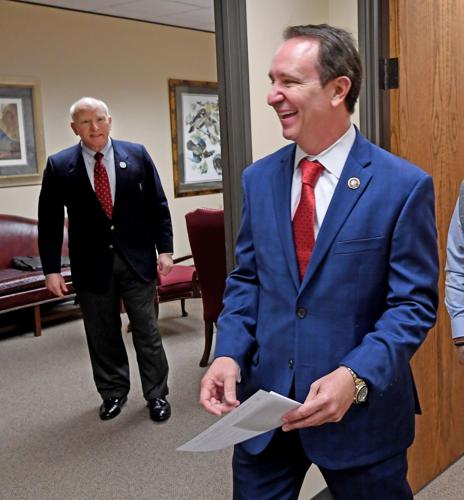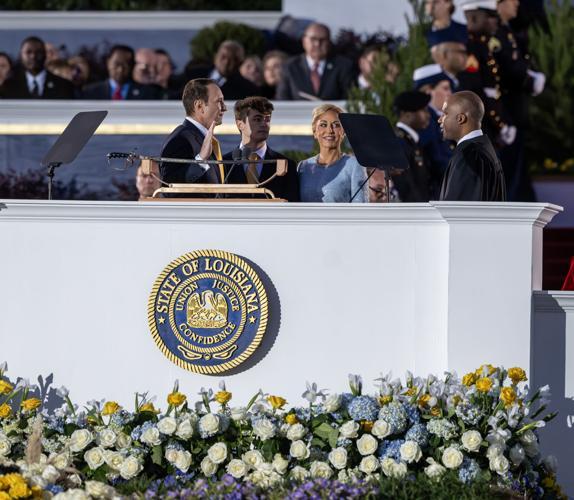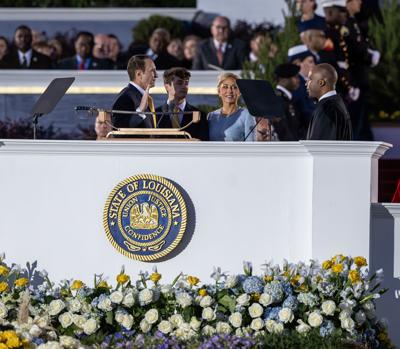Newly inaugurated Republican Gov. Jeff Landry wants state lawmakers to jettison Louisiana’s “jungle” primary system and move to closed party primaries in what would be a major overhaul of the way people participate in elections.
Since a directive by then-Gov. Edwin Edwards in the 1970s, all but a few Louisiana elections have featured an open primary, where all comers compete in one contest regardless of party affiliation and the top two vote-getters advance to a runoff. That’s in contrast to most other states whose candidates vie for their party’s nomination in separate primaries then square off in a general election between a Democrat and a Republican.
Politicians have long debated whether to change Louisiana’s system to make it more like those in other states. Landry’s request — which the governor included Monday, his first day in office, in a call for the Legislature to convene a court-ordered redistricting session — means lawmakers could vote on that question as soon as next week.
“The party’s been arguing for it for decades,” said Louis Gurvich, the Louisiana Republican Party chair. “Hopefully soon we’ll have our fondest wish.”
Landry, the state Republican Party and some members of the state’s congressional delegation have pushed for the change. So have some Democrats who want voters to have more say in picking nominees. Republicans’ desire for closed primaries sharpened under the governorship of John Bel Edwards, a conservative Democrat who served two terms and twice defeated Republican opponents in narrow and bitterly fought elections, said Robert Collins, a professor of public policy and urban studies at Dillard University in New Orleans.

Louis Gurvich, chairman of the Republican Party of LA, left, watches as Louisiana Attorney General Jeff Landry, right, walks to file paperwork for Donald Trump to appear on Louisiana's primary ballot at the Secretary of State's Office Thursday Jan. 9, 2019, in Baton Rouge, La.
“(Landry’s) theory in the long run seems to be that a closed-primary system will not only produce stronger candidates, but will also produce more conservative candidates, because there won’t be... conservative Democrats and moderate Republicans crossing over,” Collins said.
Landry’s first-day directive underscores the importance of closed primaries to the new governor and his political allies as they start enacting a conservative policy agenda across state government. Because it’s the beginning of his term, lawmakers will be eager to placate Landry when they convene next week for the special session, several legislators said.
But opposition from some Republicans, scheduling demands of the eight-day redistricting session and new polling that suggests voters don’t back the idea mean the plan could still face headwinds.
Lawmakers could approach the issue in many ways. They could make no change to the current system. They could opt to only put closed party primaries in place for state races, while leaving open primaries in place for local and federal races. Or, they could move the state to closed primaries for elections at all levels.
They could also choose whether to let the state’s 800,000 unaffiliated voters cast ballots in a party primary of their choice. Louisiana has about 1.1 million registered Democrats and a million registered Republicans, and Republicans’ voter rolls have grown in recent years as registered Democrats have changed parties.
House Republican delegation Chair Rep. Mark Wright, R-Covington, said in an interview Tuesday that he plans to file a bill during the special session that would transition all elections to the closed primary system. Wright still wants to allow political independents and "no party" voters to cast ballots in the party primary of their choice.
Wright acknowledged that getting political support for closed primaries at the local, state and federal level would be a challenge. The greatest need for closed primaries lies in state elections, he believes.
“I think closed primaries allow for a greater opportunity for an underdog,” he said.
In a statement, House Speaker Phillip DeVillier, R-Eunice, said he supports the push for closed primaries. But drawing new congressional maps — the main goal of the session, which is set to last from Jan. 15 to Jan. 23 — will be the priority, he said.
“If we’re going to get to the issues that are important to our constituents such as crime and infrastructure, we have to get this task out of the way first,” he said. “In terms of closed primaries being in the call, I support them and will be working closely with members to educate ourselves on the issue.”
Senate President Cameron Henry, R-Metairie, did not return a phone message.
Secretary of State Nancy Landry, whose office would be tasked with putting in place voting system changes approved by the Legislature, did not take a position on Landry’s proposal. A spokesperson said her office is prepared to implement any changes the Legislature approves.
Polling released Tuesday by John Couvillon, a Baton Rouge-based analyst and pollster who typically works with Republican clients, suggests voters aren’t keen on closed primaries. Couvillon in December polled 650 Louisiana voters on behalf of Republic Renewal, a national group advocating for open primary elections. Sixty-five percent of respondents said they prefer the current system while 56% said they oppose switching to closed primaries.
Asked how a projected $5.6 million-per-election price tag for adjusting to closed primaries affected their opinion, 60% said the price made them less likely to support the change. Gov. Jeff Landry’s office declined to comment on the poll’s results.
So too have elected officials publicly opposed the effort. Lt. Gov Billy Nungesser slammed it Monday, saying closed primaries could lead to more extreme candidates in both parties. U.S. Sen. Bill Cassidy and U.S. Rep. Garret Graves have opposed the idea in the past. Nungesser, Cassidy and Graves are all Republicans.
In a statement, Cassidy said polling has shown voters would prefer to spend tax dollars on things like roads, bridges and fighting crime than on reconstructing the state's voting system.
"This is a very unpopular idea that was tried a few years ago and it caused massive confusion," Cassidy said.
Steven Procopio, president of the nonpartisan Public Affairs Research Council, said the proposal risks disenfranchising independents and unleashing confusion at the ballot box for voters accustomed to the jungle primary system.
That was one result of a brief window from 2008 to 2010 when the state closed primary contests for congressional elections, political insiders recalled.
“We just know when we went through this before, there was a lot of confusion, some anger, and that’s why it didn’t stick around,” Procopio said.



